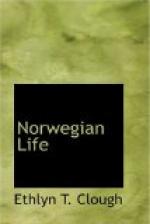It was characteristic of him, too, that when he married, he did so out of love. On a tour through several countries; in 1856, he was fortunate enough to meet Princess Sophia of Nassau. The courtship was brief and ardent. Within a few months occurred the engagement, and the wedding followed in less than a year. To the last that royal couple remained strongly devoted to each other in spite of widely differing tastes and temperaments. She has all her life been intensely religious, with a strong leaning toward pietism, and illness has still further developed this inborn tendency. He, on the other hand, was always gay, light-hearted, fond of merriment, and given to many pleasures and pursuits which his spouse could only look upon as far too worldly.
Duke Oscar Frederick, as he was known in those early days, found himself heir to the throne after death had unexpectedly removed the two claimants with rights prior to his own. And on the succession of his eldest brother, he became the Crown Prince. It was a delicate position which imposed on him a reserve foreign to his nature. As it contrasted sharply with the unceremonious jollity of his brother, King Charles, he came by degrees to be regarded by those ignorant of his true character with a distrust bordering on dislike. Thus, when the succession fell to him in 1872, he found himself little understood and less loved. It took him years to overcome the prejudice. Perhaps it was his sanction of the impeachment proceedings by the Norwegian Radicals against the retiring Conservative ministry which, in the early ’80’s, first served to turn the trend of public opinion in his favor, both in Sweden and Norway. That act was one of the many by which he showed his ability to submit his own inclinations to the demands of the people without becoming a mere tool in the hands of any one political party. About the same time he succeeded in bringing about a deeply needed and by himself long-cherished reform of the popular educational system in Sweden. Previously,—it was, in fact, his first important step after his ascension to the throne,—he had on his own initiative proclaimed full freedom of worship for persons not belonging to the established church.
A Scandinavianism of the purely sentimental kind,—the kind that talked without ever dreaming of putting the talk into deeds,—had prevailed until then on the peninsula. Intermixed with it was an equally sentimental sympathy with France. Though himself the grandson of a Frenchman and still keenly devoted to French literature and art, King Oscar had the foresightedness to recognize that the interests of the country were more closely bound up with those of Germany. And one of the most striking features of his reign was the growing cultural intercourse between the nations in the north and their neighbor south of the Baltic. And while the king discouraged the speech-making, empty Scandinavianism against which Ibsen was fond of launching his most vitriolic invectives,




